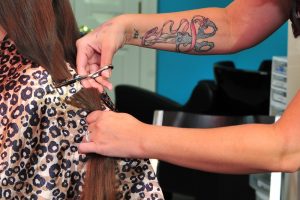 Much attention in Washington, D.C., in recent weeks has been focused on a criminal justice reform bill designed to put a greater focus on rehabilitating inmates and trying to reduce the recidivism rate in the U.S.
Much attention in Washington, D.C., in recent weeks has been focused on a criminal justice reform bill designed to put a greater focus on rehabilitating inmates and trying to reduce the recidivism rate in the U.S.
But at the same time, according to a lawsuit filed this week in Pennsylvania, some people with criminal pasts who have already been rehabilitated are finding that their career options are being stifled in the relatively mundane field of esthetics.
Estheticians are licensed beauty professionals focused on skin care of the face. Their work in Pennsylvania is regulated by the State Board of Cosmetology.
The nonprofit Institute for Justice, a legal advocacy organization, filed the lawsuit in Pennsylvania’s Commonwealth Court on behalf of two clients who they say were unfairly denied licenses as estheticians on the basis of past legal woes. The cosmetology board, the lawsuit says, determined that having a criminal past was a sign of poor “moral character” that dictates the two women should not be allowed to practice.
The two clients, Amanda Spillane and Courtney Haveman, each completed the more than 300 hours of cosmetology training required to earn a license at a cost of more than $6,000 in tuition.
Institute for Justice attorney Andrew Ward told Watchdog.org that the “moral character” requirement to obtain an esthetician license in Pennsylvania should be ruled unconstitutional by the courts.
“The very first section of Pennsylvania’s constitution, Article One, Section One, says that people have the right of pursuing their own happiness,” Ward said. “And for decades, the Pennsylvania courts have consistently interpreted that section of the Constitution as saying requirements that prevent people from working need to actually be related to protecting the public. Good character has nothing to do with skincare. And so it fails that test.”
The institute’s lawsuit notes that other aspects of the enabling legislation that created the cosmetology board allow it to revoke or decide not to issue licenses for people who commit crimes related to their field. As a result, the “moral character” clause is largely used to deny licenses to those who have a criminal record unrelated to cosmetology.
In the cases of Spillane and Haveman, both women formerly had substance abuse issues that led them into legal trouble, but both have lived sober and free of any new legal issues for five years or more. But despite giving the appearance of being rehabilitated and functional members of society, the cosmetology board determined that they were unfit to work as estheticians.
“Although Appellant’s ability to maintain employment, complete esthetician training, and refrain from committing additional crimes since being released from prison is laudable, such accomplishments do not serve to negate the record of poor moral character Applicant developed over the course of several years so as to establish her current good character,” an order rejecting Haveman’s application read, according to the institute’s lawsuit.
To Ward, creating such a high hurdle for rehabilitated former criminals to prove that they’re fit to perform such jobs imperils the very concept of rehabilitation in Pennsylvania.
“Denying women who are trying to support themselves just makes it harder to take those first few steps back on the right path,” Ward said. “I mean, we’re talking about an industry that is traditionally something that people with less education can use to pull themselves up in the world. And in fact, there’s a recent study from Arizona State University confirming that when the government makes it harder to get a license, recidivism rates tends to increase in those states.”
Ward pointed out the apparent contradiction of Pennsylvania’s prisons in many cases teaching inmates cosmetology skills while they’re incarcerated, only to deny them the opportunity to pursue a career in that field upon release. And in another instance of government working against itself, he noted that Haveman was forced to rely on public assistance to make ends meet after her license application was rejected.
He also pointed to another case decided in the state earlier this year where the cosmetology board was rebuked by the Commonwealth Court for improperly assuming the duties of criminal law enforcement.
“No one should be denied the right to work because of irrelevant criminal convictions,” Ward said. “This just makes it harder to take those first steps on the economic ladder.”








